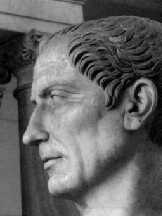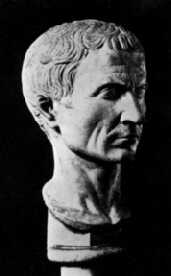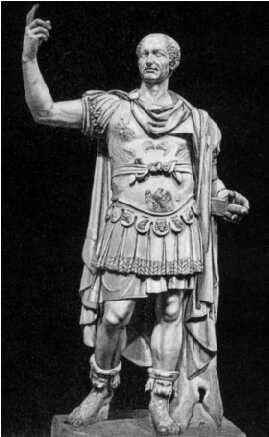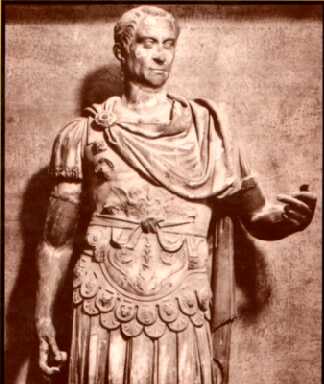[Gaius] Julius Caesar
Born: 100 BC in Rome
Died: 15 Mar 44 BC ('the Ides of March') in Rome (murdered)
Father: Gaius Caesar (c140-84 BC)
Mother: ?
Spouses:
- m1. 84 BC Cornelia d69 BC (dau of Cornelius Cinna)
- affair w/? (mother of Brutus, who may have been JC's son, tIoJC p93)
- m2. 67 BC Pompeia
- m3. 59 BC Calpurnia
- m4. 48 BC Cleopatra (affair, pic from tIoJC p83)
Children:
w/Cornelia
Julia b. c76 BC m. Pompey
w/Cleopatra (Caesar refused to ack)
Caesarion b47 BC
At right, Caesar (JC2 p2, BAR?) ===>>
|

|

|
JC2: "According to legend, Rome was founded in 753 BC ... Over 100s of yrs Romans waged war and forged alliances to gain control of most of the Italian peninsula ... The highest govt officials were the (2) consuls ... [this system] allowed a small group of aristocrats to control power ... no political parties ... so powerful families made alliances ... [At the time of Caesar's birth, the out-of-power aristocrats] appealed to the poorest people ... [and] were called populares. The [in-power families] called themselves optimates ('the good men') ... [this struggle became increasingly violent, w/street gangs, etc.] In 88 BC, a great stuggle broke out when a populare named Gaius Marius and his allies fought against the optimate Sulla (pic from JC2 p10?) and his supporters. Sulla won. He captured Rome in 82 BC after a series of civil wars. He was elected dictator, but no term limit was given [during times of crisis, a dictator was normally a 6mo term]. Marius had died during the fighting, and during Caesar's youth Sulla ruthlessly attacked Marius' old allies ... Caesar's family were patricians, members of Rome's old aristocracy. The Julii, as they were called, claimed they could trace their roots to the goddess Venus. By Caesar's time, though, patrician families were no longer very powerful ... When Caesar was young, 2 of his relatives were consuls. But his family was mostly on the side of the populares. Marius had even been married to Caesar's aunt Julia ... [so] Caesar sided with the populares ... To further advance his early career, Caesar m. Cornelia, dau of Cornelius Cinna, Marius' closest ally [who] became a leader of the populares ... Sulla ordered [their] divorce ... Caesar refused and was forced into exile ... 80 BC sailed east, where he served the Roman governor of Asia. He became friends with King Nicomedes IV of Bithynia ... After Sulla d. in 78 BC, Caesar returned to Rome ... [75 BC, JC is 25, he] set sail for the island of Rhodes to study oratory. But on the way, a band of pirates captured the ship and kidnapped him ... [after his ransom was paid and he was released, he went back and] captured the pirates, and crucified the entire gang ... In 69 BC (30yo) Caesar was serving as governor in Farther Spain ... in Cadiz, [he] went to see a statue of Alexander the Great ... [he] wept w/envy ... [he] admired and studied the 2 most successful Romans of his day, Pompey (pic from tIoJC p22) and Crassus ... [he befriended them both as his career continued to rise, bribed his way to] pontifex maximus (high priest), a position of great political importance ... elected praetor (high-ranking judge) in 62 BC ... formed First Triumverate [Caesar, Pompey, Crassus, all 3 populares, uneasy alliance since all were ambitious, wanted sole cntl] in 60 BC ... Cato the Younger, one of the most respected optimate leaders (w/Cicero, defenders of the traditional Roman Republic), opposed the Triumvirate ... When Caesar's consulship ended in 59 BC, he was awarded the position of proconsul [governor who acted in place of consul] in Gaul. With that office he would recruit and train an army that would be loyal to him [i.e. for later use in winning sole cntl of Rome]. He set out on what would become one of the bloodiest military campaigns in history ... [he defeated the Helvetii (Swiss), Germans (led by Ariovistus), Belgae, Veneti (W Gaul seafarers), British, Gauls (led by Vercingetorix, 52 BC Siege of Alesia [Dijon], Caesar himself wrote a famous history of the Gallic Wars) ... After his exploits in Gaul he had more fame, wealth, and military power [loyal troops] than anyone in Rome. Many feared he would seize control of the govt ... [meanwhile] The optimates in the Senate had made an uneasy [alliance] w/Pompey [seeing him as lesser evil, and] Crassus [had] lost a battle against the Parthians [killed] ... Late in the year 50 BC Caesar and Pompey drew up their armies ... 10 Jan 49 Caesar crossed the Rubicon [small river dividing Italy from Cisalpine Gaul], declaring 'the die is cast' ... [Caesar first defeated Pompey's army in Spain, then pursued Pompey himself into Greece, defeating him at the 9 Aug 48 Battle of Pharsalus, after which Pompey fled to Egypt] Caesar arrived in Egypt just a few days after Pompey. When he landed, he was presented w/Pompey's head ... [causing him to weep, since he respected his foe] ... Cleopatra, 20yo sis of Ptolemy XIII, wanted to challenge her bro and seize the throne [had herself wrapped in rug, popped out by Caesar] ... Caesar [was impressed, fell in love, decided to support her, called Roman reinforcements from Syria, fought] what [he] called the Alexandrine War [Nile cruise w/Cleopatra] ... Near Zela in Asia Minor he defeated Pharnaces II, son of Rome's old enemy Mithradates. After the brief battle, Caesar summed up the campaign in a dispatch to Rome with the famous words veni, vidi, vici ('I came, I saw, I conquered' ... he then defeated Pompey's sons, Cato, Numidian mercenaries in N Africa) at the city of Thapsus (in modern Tunisia) in Apr 46 ... In July 46 Caesar returned to Rome, was made dictator for 10 yrs ... Meanwhile, Pompey's 2 sons [tried to regroup in Spain,] Caesar led his own army to Spain Nov 46, defeating them at Munda March 45 ... Caesar used his powers justly, giving Rome many needed reforms ... [he refused the title Emperor out of respect for the Senate, but k. 44 BC by Brutus and others at the Senate by '23 plunging daggers'] they decided that only by killing him could they save the Republic ... Soon after Caesar was killed, though, the Roman Republic also died. Caesar's adopted son, Octavius, and his lt., Marc Antony (pic1, pic2 from tIoJC p49, 76), defeated his chief assassins in 42 BC. Then they turned on each other. The civil war between Octavius and Antony finally killed the Republic. Octavius prevailed and took the position that Caesar would not - first emperor of Rome. Like all Roman emperors to come after him, Octavius adopted the name Caesar. Even after the last Caesar ruled Rome, despots and kings used the name Caesar to invoke the powers of supreme command - in Russian, czar (or tsar); in German, kaiser; and in Arabic, qaysar. Perhaps because of his absolute power, Julius Caesar will live always as the symbol of the eternal tyrant."
tIoJC: Upon his return to Rome in July 46 BC (after defeating Juba the Numidian et al in N Africa; King Juba, Pompey's f-i-l General Metellus Scipio, Petreius d. fighting, Afranius executed, Pompey's sons Gnaeus and Sextus escaped to Spain, Marcus Cato committed suicide), Caesar accomplished several bold social initiatives, including forming 3 new Roman colonies to relieve unemployment in Rome (Carthage, Corinth, Seville) and planned many more, but his early death preempted them. Nov 46 Caesar left for his last battle, defeating Pompey's sons at Munda 17 Mar 45 (k. 30K of them, but also lost 1K of his own best troops). Upon his return to Rome Autumn 45, he "proved himself an administrator and civil leader of extraordinary skill, perhaps even of genius" (85). He ruled as a benevolent dictator, not merely enriching himself but improving people's lives (remember, he was a 'man of the left,' i.e. populares v. optimates). "He sincerely believed that most everyday people would readily give up a few republican freedoms in exchange for useful jobs, financial security, and confidence that the govt would meet their needs. In this regard, he was right, for most ordinary plebes responded favorably to his social programs. It was mainly ... optimates, who opposed his autocratic rule ... partly because of nostalgia for the old republican institutions, but also because Caesar, in seizing absolute power, had robed them of their own" (86-7). Caesar had planned to reduce slavery, open magnificent public libraries, canals. He did manage to introduce the Julian calender to replace the lunar one, have a new month (July) named in his honor. Caesar "showed himself to be such a talented, energetic, concerned, and just ruler that even Cicero was amazed ... 'struck with astonishment at Caesar's sobriety, fairness and wisdom'" (89). But he did pack the Senate w/cronies and rumors spread that, under the influence of Cleopatra (continuing mistress), he planned to reintroduce monarchy (following Egypt). The last straw was when he announced he would leave Rome 18 Mar 44 for Parthia for another campaign of conquest. The Senators were enraged that he would place them at the mercy of his henchmen in Rome (e.g. Cornelius Balbus, Gaius Oppius, whom they viewed as social inferiors). Hmmm, trajedy or poetic justice? "He had accomplished much that was admirable, constructive, daring, and certainly brilliant in his turbulent 55 yrs. But he had also pursued power in a relentless and ruthless fashion ... his life and death seem to confirm the old adage [Bible ref?] that a person who lives by the sword will inevitably die by the sword. At the height of his power, his enemies had toppled him using the very same tactics of intrigue and violence that he himself had so coldly and expertly employed" (96).
tIoJC cont.: The conspirators failed for 2 reasons; 1) His death unleashed a backlash by "plebes, populares, and soldiers [who] saw him as their champion" (97) and 2) "the republic they were defending existed more in their minds than in reality. As Caesar had long ago realized, [it] had been dying of mortal wounds ever since ... Marius and Sulla" (97). For a time, Rome was paralyzed, then civil war ensued. "After driving the conspirators and their supporters from Italy, Antony soon joined forces with Marcus Lepidus, a powerful general, and Gaius Octavius, known as Octavian. Caesar's gnephew and adopted son, the 18yo Octavian appeared at first glance [weak] ... Only Cicero [forsaw his rise] ... Antony, Octavian, and Lepidus formed the 2nd Triumvirate in the winter of 43 and, in a purge reminiscent of those of Marius and Sulla, immediately began eliminating their enemies. Cicero, the last great republican remaining in Rome, was first on their hit list, and they hung his head in the city's main square. The triumvirs then proceeded to Greece, where Cassius, Brutus, and their republican diehards had raised an army with which to make their last stand. In the summer of 42, near Philippi, in N Greece, Caesar's successors crushed these last remnants of the republic. Overcome with anguish and hopelessness, Cassius and Brutus committed suicide ... [the triumvirs then turned on one another] Antony and Octavian first pushed Lepidus aside and then fought each other ... As Caesar had done, Antony took Cleopatra as a lover and ally. But the lovers' dreams of ruling Rome together evaporated when Octavian decisively defeated them in a huge sea battle near Actium, in W Greece, in the spring of 31 [with the aid of his friend, the military strategist Marcus Agrippa 99]. Antony and Cleopatra fled to Alexandria and soon afterward, with Octavian closing in on them, they took their own lives" (98). Octavian became Rome's first emperor (i.e. Imperator Augustus Caesar or 'The Great Victor and Ruler'), and after 15 yrs of civil war since Julius Caesar's death, most people were relieved at his imposed order and stability (i.e. happy to trade some freedom). "Under the long line of Augustus's successors, each of whom also took the prestigious title of Caesar, Rome continued to expand until it encompassed 3.5 million square miles and more than 100M people" (100).
Playing cards celebrate 4 great kings in history: Julius Caesar is the king of diamonds, Charlemagne hearts, Alexander the Great clubs, and David spades.

Julius Caesar (JC2 p57)
|

Julius Caesar (JC1 cover) |
Sources:
- tIoJC = The Importance of Julius Caesar, Don Nardo, Lucent Bks, 1997 (FHL).
- JC2 = Julius Caesar, Robert Green, Franklin Watts (Grolier), 1996 (FHL).
- MBKQ = The Mammoth Book of British Kings and Queens, Mike Ashley, Carroll & Graf, 1999.





